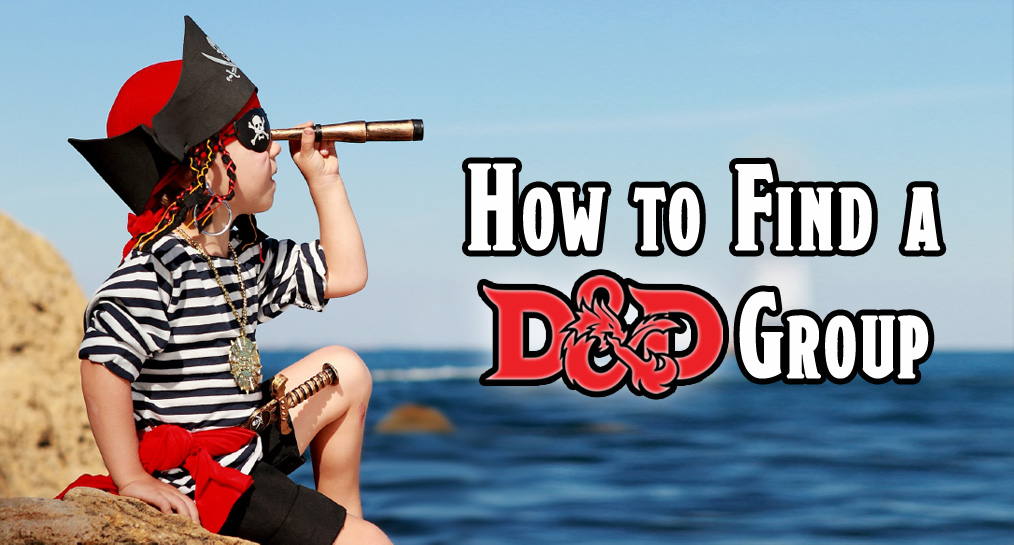
So you’ve decided you want to start playing Dungeons and Dragons, have gathered all your dice and supplies and have created your very own character. Now all you need is to find some people to play D&D with you.
This article will answer your burning questions about how to find (or start) a Dungeons and Dragons play group. How many players do you need? Where can you find players? Who are the right people to ask to play with you?
Your options are actually more numerous than you may first assume. Given the increasing popularity of Dungeons and Dragons in mainstream media, there are more people than ever that are willing to roll some dice with you and have an epic D&D adventure.
How Many People Do You Need?
Dungeons and Dragons is a game you play with a group. At minimum, you need two people, but the upper limit depends on the style of game you want to play, and how much your DM can handle. Most people find the ideal group to consist of one dungeon master, and four to six players.
It is possible to run a game with a Dungeon Master and a single player. One-on-one sessions are intimate, and very personal. It can feel like playing a single-player adventure video game like The Legend of Zelda or Tomb Raider. DMing for a single player allows you to take great liberties in interactive storytelling, and really tailor the game to the personal tastes of the player.
This is a good device to use for a player who becomes separated from the party during a group campaign, or for a new player who you are going to introduce to a game before sitting at the table with a larger group.

“DMing for a single player allows you to take great liberties in interactive storytelling, and really tailor the game to the personal tastes of the player.”
Running a game with four to six players is ideal. This is because it allows the party to touch on all the major archetypes of characters: melee combatant, ranged combatant, arcane caster, divine caster, and support characters. Having a base group of four to six players means that if one or two people can’t make it to a weekly game, the rest of the group can carry on in their absence without feeling too short handed.
It is possible to run a game with more than six players, though having all of them in a game at the same time might be too much to keep track of, space might be an issue, and the time between turns in combat may cause some less devoted players to lose interest. If your group becomes too large, consider splitting it into two groups, or alternating players in different sessions.
A popular style of game includes a group-designed world, where a common setting is used, and each player is given the chance to run a game for a select group of players.
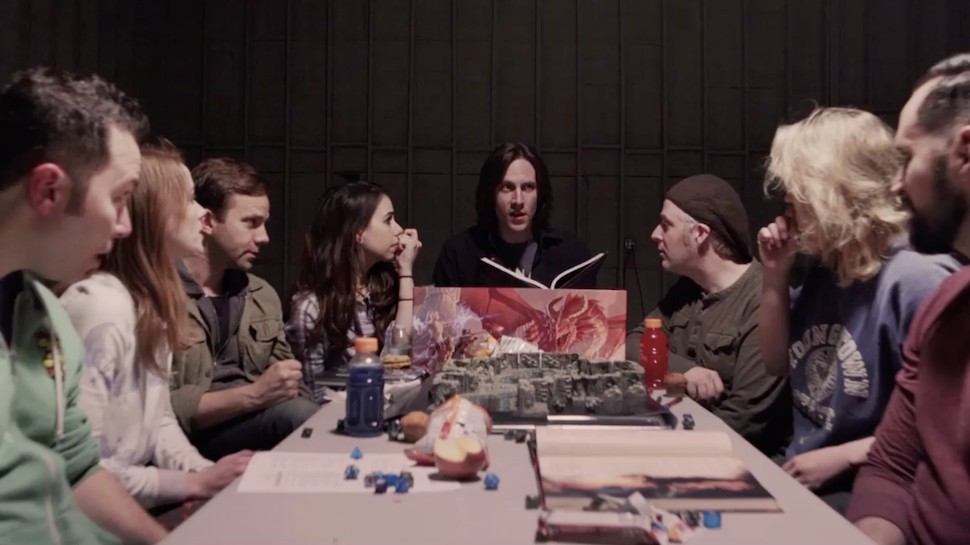
It can take Matt Mercer-like skills to DM for a large group effectively.
Where Can You Find Them?
Finding people to play Dungeons and Dragons is hardly as simple as gathering a few friends to play a board game like Monopoly of Life. A Dungeons and Dragons campaign can last for weeks or even years, and the barrier to entry is steep. There are a lot of supplies and knowledge a group needs to obtain before they can gain the momentum required to sustain a long-term campaign.
Family and Friends
If you’re the kind of person who’s inclined to play Dungeons and Dragons, chances are you’ve got friends who feel the same way. Anyone you know who enjoys adventure video games, action movies, comic books, and popular fantasy TV shows has the chops to start playing D&D.
If you’re a parent, perhaps your children and their friends would enjoy an adventure? Playing D&D with kids can be very rewarding, as the imagination of a child is leaps and bounds more.
Know some kids that would love D&D? Check out our in-depth guide on How to Play D&D with Kids.
Friendly Local Game Stores (FLGS)
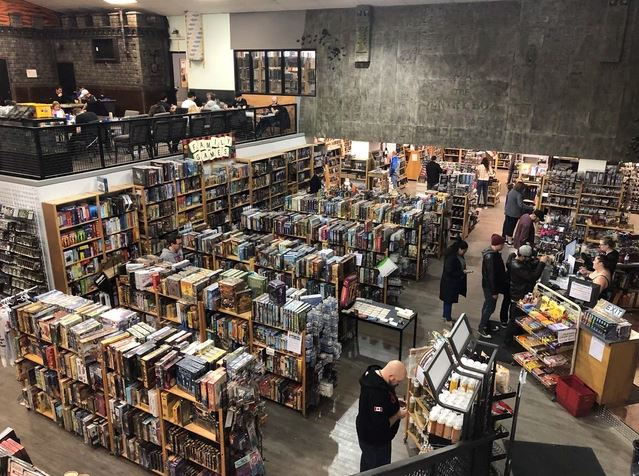
Your local comic, game, and event retail locations are great places to start looking for players. If you’re new to the game and are looking for a seasoned DM to run a game for you and your friends, any place that sells the Dungeons and Dragons hard cover books is a good place to inquire about local players. Some local stores run Adventurer’s League games or have tables available for locals to run games with their groups.
Bumping into another gamer perusing the RPG Source Books aisle at your local Barnes and Noble or independent book seller is an easy way to get started. New books come out every few months, and gamers will come by to look for new releases.
You can find a FLGS using the Wizards of the Coast Store and Event Locator
The D&D Adventurer’s League
The publisher of Dungeons and Dragons, Wizards of the Coast, runs sanctioned adventures at brick-and-mortar stores using qualified Dungeon Masters who have experience with the adventure of the season. The Adventurer’s League features a standard character creation, experience, and loot schedule which is consistent across all locations. This makes it easy for someone who frequently travels to jump into games in different locations and feel right at home.
Check out the Adventurer’s League Website to learn more about how the League works, the adventure that is currently being run across the country, and to find a location where you can join the party!
Conventions
Any place nerds gather in droves is bound to be full of dice rollers and dungeon masters. Most conventions offer scheduled and structured tabletop roleplaying games you can sign up for as an individual or as a group, rental and lending libraries of gaming materials, and/or a free-play area where you can get your game on!
Conventions are a great place to test out new games without committing to a long campaign, meeting people from all over the country, and cultivating a relationship with publishers, artists, creators, and other gamers from all over the place.
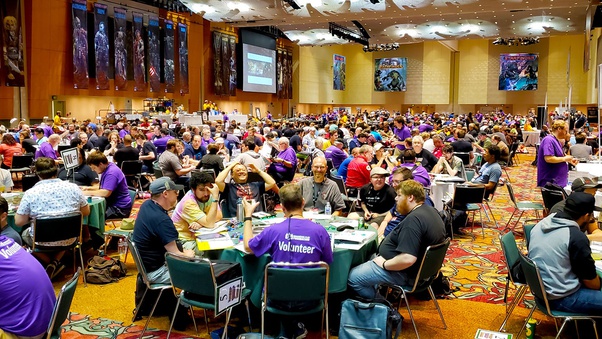
If you’re interested in playing Dungeons and Dragons, or any other games online, meeting people at conventions is a great way to spark that relationship. Sharing a table with someone for an afternoon at a convention and exchanging information can lead to a wide network of friends to meet up with at future conventions or to engage in online play.
Some of the best gaming conventions across the USA Canada are:
- Breakout Con in Toronto, Canada
- PAX Unplugged in Philadelphia, Pennsylvania
- Origins Game Fair in Columbus, Ohio
- GenCon in Indianapolis, Indiana
- GaryCon in Lake Geneva, Wisconsin, home of the late creator of Dungeons and Dragons, Gary Gygax!
- Dragon Con in Atlanta, Georgia
- San Diego Comic Con in San Diego, California
- PAX West in Seattle, Washington
Online Gaming
If you have a guild in a game like World of Warcraft, or any other MMORPG, you might see if they are interested in playing a more creative and slower-paced game like Dungeons and Dragons.
Other options for finding online players are to look through Facebook groups, Meetup groups in your city, or online resources like Reddit’s Looking for Group subreddit.
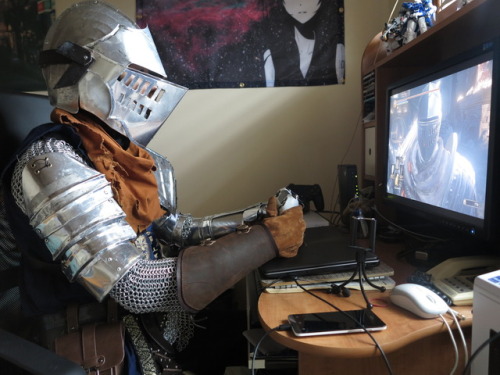
There are a ton of virtual tabletop suites at various price points available for online gaming, which is perfect for playing with friends who live far away, or during a global pandemic when sitting around a table with your friends in person is discouraged. Some of the best options for online D&D are Fantasy Grounds, available on Steam, Roll20, and D&D Beyond.
For a more detailed look into your options of playing D&D Online check out our in-depth guide How to Play D&D Online.
When and Where to Play D&D
Once you’ve got the group assembled, the hard part begins: deciding on an adventure that fits everyone’s expectations and fitting a game into everyone’s schedules.
Choosing a Location
Depending on how you’re going to play your game, there are tons of options. A public game with people you met online or at a store would best be played in a public place. If your FLGS has table space, that can be a perfect location. Be sure that when using a public place, you are courteous to others in terms of language, volume, length of time occupying a space, and how you handle your food and beverages.
If you’re hosting a game in your home, a kitchen table works just fine. Wherever you decide to play, make sure you’ve got ample space for everyone’s books, character sheets, and the game board.
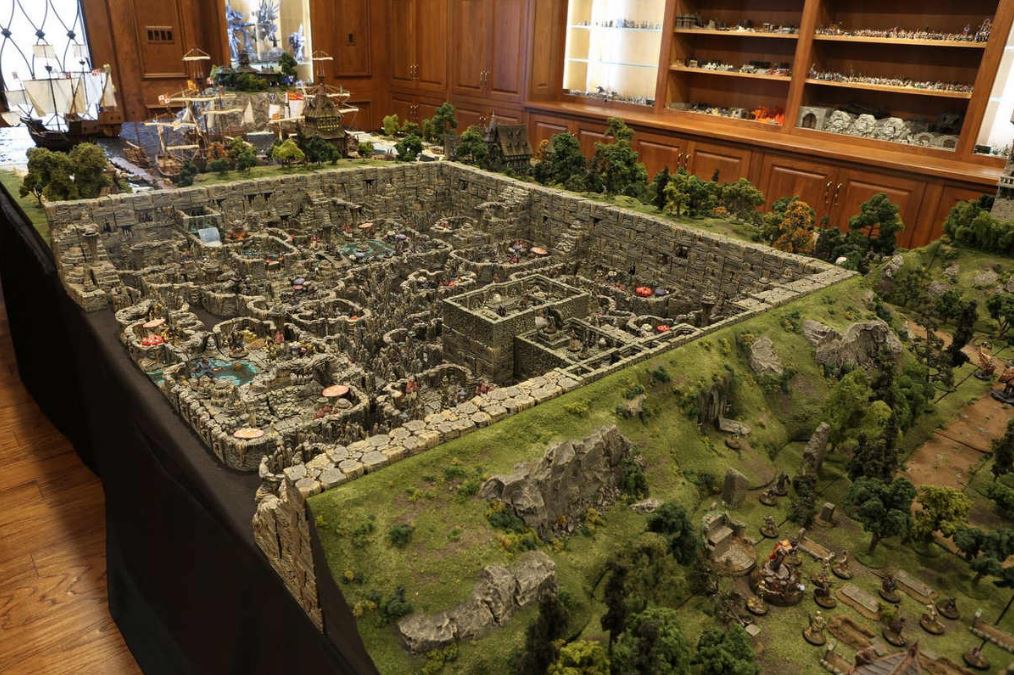
Some D&D tables are better than others…
Campaign vs. One-Shot
If you’re just starting out, a one-shot adventure might be best for you. There are a ton of single-session adventures available on the Dungeon Master’s Guild. A single session can last anywhere from three hours to a whole day, depending on how much detail you go into, and how thorough you are exploring areas.
To run a short campaign like the adventures included in the Starter Set and Essentials Kit is enough for a novice player to get a grasp of the rules and learn the basics of the game. These are both short, fun adventures that can be played over the course of a few sessions.
For a more complete breakdown, check out our in-depth reviews of the official D&D Starter Set and Essentials Kit.
If you’re looking for a weekly game that can span months of play time, check out one of the published campaign books like Waterdeep – Dragon Heist or Storm King’s Thunder. These will see the players go from 1st-level all the way to 10th-level and beyond. Starting in on one of these hard-cover campaign books can keep a gaming group enthralled for a whole year or more of weekly play.
Published adventure vs. Homebrew
Starting off with the existing published material is a good idea for first timers. The D&D Starter Set and D&D Essentials Kit are the perfect product to use for a group looking to get into the game, as they both come with most of what you need to get going. More experienced player would find a campaign book such as the classic Curse of Strahd a good resource to run a long-term game.
For those players looking to stretch their creative muscles, writing your own game from scratch can be very rewarding, though it is a lot of work. To help with this, there are a ton of resources, from monsters to encounters to full adventures available from online outlets. A huge library of homebrew content is available online from the Dungeon Masters Guild and Drive Thru RPG.
Scheduling D&D Games
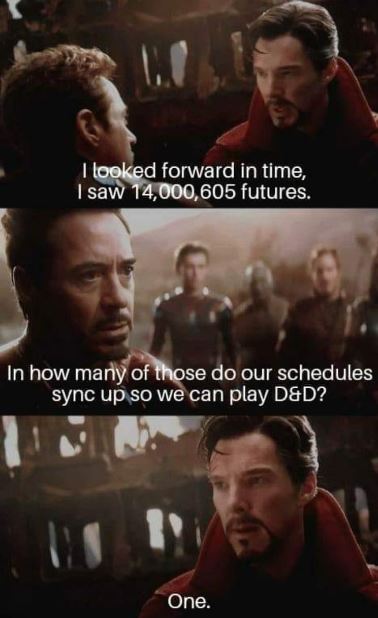
The older we get, the more responsibility we have. It’s an unfortunate fact of life. Sometimes, scheduling an hours-long game session with six people can be the hardest part of playing D&D at all. Maintaining a consistent game group of dedicated players is the single greatest achievement a Dungeon Master can accomplish.
Finding a common time and place to play is often more difficult than slaying the strongest dragon, but there are tools available to help. Using free online scheduling software like Doodle polls and Google Calendar are your best options for getting everyone on the same page.
The League is Set, and the Game is Afoot!
Hopefully this long list of options helps you to fill your table with eager adventurers who will follow you to victory and riches in the game of your choice! No matter how you choose to find players for your game, remember it’s more important to surround yourself with the right people than with the most people. D&D is an interactive, cooperative, storytelling adventure. You want to party up with reliable, trustworthy, and creative people who will enhance your game sessions. Selfish, disruptive, and inconsiderate players need not apply.
However you choose to play, and whoever you choose to play with, Dungeons and Dragons can be a very rewarding experience for you and your group. The game is a great way to pass the time, but never forget that the real treasure is the friends you make along the way.






